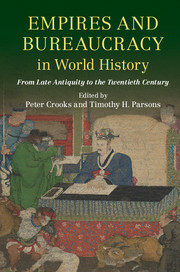Book contents
- Frontmatter
- Contents
- List of Figures
- List of Maps
- List of Tables
- List of Contributors
- Preface
- List of Abbreviations
- Part I Introduction
- Part II Empires and Bureaucracy in World-Historical Perspective
- Part III From Late Antiquity to the Middle Ages
- Part IV From the Age of European Expansion to the End of Empires
- 12 Magistrates to Administrators, Composite Monarchy to Fiscal-Military Empire: Empire and Bureaucracy in the Spanish Monarchy, c.1492–1825
- 13 Britain's Overseas Empire before 1780: Overwhelmingly Successful and Bureaucratically Challenged
- 14 ‘Les Enfants du Siècle’: An Empire of Young Professionals and the Creation of a Bureaucratic, Imperial Ethos in Napoleonic Europe
- 15 Bureaucracy, Power and Violence in Colonial India: The Role of Indian Subalterns
- 16 From Chief to Technocrat: Labour and Colonial Authority in Post–World War II Africa
- 17 The Unintended Consequences of Bureaucratic ‘Modernization’ in Post–World War II British Africa
- Part V Afterword
- Index
16 - From Chief to Technocrat: Labour and Colonial Authority in Post–World War II Africa
from Part IV - From the Age of European Expansion to the End of Empires
Published online by Cambridge University Press: 05 August 2016
- Frontmatter
- Contents
- List of Figures
- List of Maps
- List of Tables
- List of Contributors
- Preface
- List of Abbreviations
- Part I Introduction
- Part II Empires and Bureaucracy in World-Historical Perspective
- Part III From Late Antiquity to the Middle Ages
- Part IV From the Age of European Expansion to the End of Empires
- 12 Magistrates to Administrators, Composite Monarchy to Fiscal-Military Empire: Empire and Bureaucracy in the Spanish Monarchy, c.1492–1825
- 13 Britain's Overseas Empire before 1780: Overwhelmingly Successful and Bureaucratically Challenged
- 14 ‘Les Enfants du Siècle’: An Empire of Young Professionals and the Creation of a Bureaucratic, Imperial Ethos in Napoleonic Europe
- 15 Bureaucracy, Power and Violence in Colonial India: The Role of Indian Subalterns
- 16 From Chief to Technocrat: Labour and Colonial Authority in Post–World War II Africa
- 17 The Unintended Consequences of Bureaucratic ‘Modernization’ in Post–World War II British Africa
- Part V Afterword
- Index
Summary
If the nineteenth century was supposed to be the age of bureaucratization in Europe, then the empires that European powers established in Africa at the end of that century should have marked the highpoint of the relationship of bureaucracy to empire. On paper, such appeared to be the case. Governors, provincial commissioners, district commissioners and district officers administered clearly marked territories as part of a civil service carefully recruited and supervised. But the realities of colonial administration were otherwise. The local official was, in the French expression, le roi de la brousse (‘king of the brush’). His authority depended on relations with local elites, referred to as chiefs; while chiefs were subject to sanctions, they knew that white officials depended on them to collect taxes, recruit soldiers and round up young men for forced labour. Day-to-day administration relied on layers of tacit understandings between European officials and local authorities, with another layer of translators, clerks and guards beneath them; colonial courts and military force were to be used only as needed. This system kept Africa fragmented enough that challenges could be contained for a time, but it was inadequate to fulfilling colonial claims of a ‘civilizing mission’ or, later, a project of ‘development’. In this chapter, I argue that the bureaucratization of empire in Africa was a task that remained to be accomplished at the end of World War II; when colonial powers at last got serious about the task, the result was not a consolidation of their power. On the contrary, it was during the attempt to modernize imperial rule that the British and French empires unravelled.
Beginning in the late 1930s, and especially after World War II, British and French governments developed a new administrative structure to take a more active role in economic development. My chapter takes as its principal case study the Inspection du Travail in French West Africa, with some comparisons to the labour officers of British Africa. Getting people to work in a productive and orderly fashion was, for obvious reasons, of great importance to imperial regimes, and both the lateness of the attempt to systematize control of labour and the urgency with which that effort was finally undertaken are striking. Here we have a set of officials, marginalized in pre-war Africa, who were empowered after the war.
- Type
- Chapter
- Information
- Empires and Bureaucracy in World HistoryFrom Late Antiquity to the Twentieth Century, pp. 391 - 411Publisher: Cambridge University PressPrint publication year: 2016



